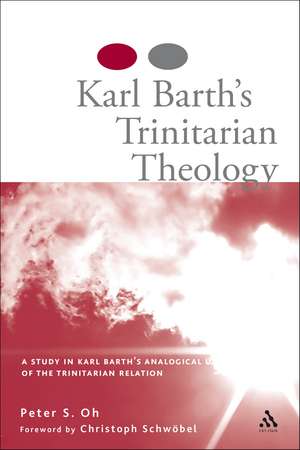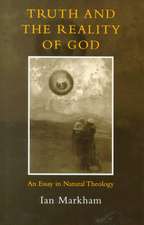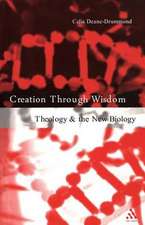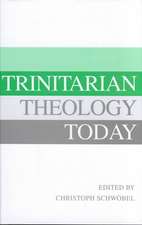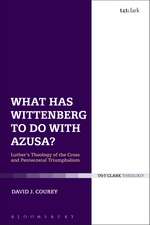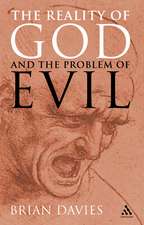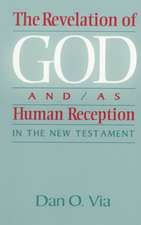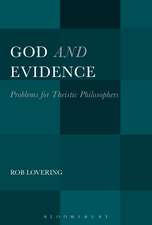Karl Barth's Trinitarian Theology: A Study of Karl Barth's Analogical Use of the Trinitarian Relation
Autor Dr Peter S Ohen Limba Engleză Hardback – 19 noi 2006
Preț: 1064.91 lei
Preț vechi: 1366.59 lei
-22% Nou
Puncte Express: 1597
Preț estimativ în valută:
203.77€ • 213.29$ • 169.60£
203.77€ • 213.29$ • 169.60£
Carte tipărită la comandă
Livrare economică 31 martie-14 aprilie
Preluare comenzi: 021 569.72.76
Specificații
ISBN-13: 9780567031198
ISBN-10: 0567031195
Pagini: 192
Dimensiuni: 156 x 234 x 13 mm
Greutate: 0.46 kg
Editura: Bloomsbury Publishing
Colecția T&T Clark
Locul publicării:London, United Kingdom
ISBN-10: 0567031195
Pagini: 192
Dimensiuni: 156 x 234 x 13 mm
Greutate: 0.46 kg
Editura: Bloomsbury Publishing
Colecția T&T Clark
Locul publicării:London, United Kingdom
Caracteristici
Constitutes an original and challenging contribution both to Barth studies and to the field of ecclesiology
Cuprins
Part I: Karl Barth's Analogical Use of the Trinitarian OntologyChapter 1. Reassessment on Karl Barth's Understanding of Analogy: A Complementary Relation of Analgia entis vs Analogia fidei Chapter 2. Karl Barth's Dialectic and It's Relation to the Complementary Concept of AnalogyChapter 3. Karl Barth's Complementary Dialectic and Its relation to the Ontological Aspect of AnalogyChapter 4. Karl Barth's Christology and its Relation to the Trinitarian OntologyPart II: Karl Barth's Trinitarian Ecclesiology: Analogical Use of the Perichorectic Pattern of the Divine Communion in the ChurchChapter 5. Kartl Barth's Trinitarian Theology of the Church: the Church Where Divine Action and Human Action Unite TogetherChapter 6. Karl Barth's Theology of Baptism: the Dynamics of the Relation of Divine Grace and Human Faith in Baptism Chapter 7. Karl Barth's Theology of Moral Redemption: the Christian Attitude of Faith, Obedience and Prayer
Recenzii
'This book carefully and thoroughly plumbs the depths of Barth's theological writing to draw out a key to its inner logic, a logic by which the whole of Barth's theology can be understood more comprehensively. That key is the trinitarian relationality of perichoresis (the mutual interpenetration and coinherence of divine Persons constituting the Triune God). Dr. Oh's book is the first that I know of that rigorously analyzes Barth's corpus and explicates it faithfully in light of its relational logic. This by itself is a great and much-needed contribution. I expect Dr. Oh's voice to be increasingly authoritative in Barth scholarship.'
'Barth's doctrines of the Trinity and the church continue to provoke debate; this thorough study offers new matters for reflection not only to Barth specialists but to any interested in the study of Christian doctrine'.
'Focusing on the concept of perichoresis in Barth's Trinitarian theology, this book offers a perceptive study of a little noticed feature of Barth's thought and ably demonstrates the considerable importance of the concept to his wider theological concerns. The book thus constitutes an original and challenging contribution both to Barth studies and also to the field of ecclesiology where the notion of perichoresis is especially applicable.'
-Mention. The Chronicle of Higher Education/ May 11, 2007
"In sum, this is a significant, if at times uncritical, exposition of Barth's theology. It makes an important contribution to broader theological discussion in its presentation of Barth's understanding of the relationship between divine and human freedom in the Christian life, and in showing how this is drawn from his Christology and rooted in his doctrine of God. This will be a significant book for all students of Barth, and useful for many working on the doctrine of God." --Don Schweitzer, St. Andrew's College, Toronto Journal of Theology
'Barth's doctrines of the Trinity and the church continue to provoke debate; this thorough study offers new matters for reflection not only to Barth specialists but to any interested in the study of Christian doctrine'.
'Focusing on the concept of perichoresis in Barth's Trinitarian theology, this book offers a perceptive study of a little noticed feature of Barth's thought and ably demonstrates the considerable importance of the concept to his wider theological concerns. The book thus constitutes an original and challenging contribution both to Barth studies and also to the field of ecclesiology where the notion of perichoresis is especially applicable.'
-Mention. The Chronicle of Higher Education/ May 11, 2007
"In sum, this is a significant, if at times uncritical, exposition of Barth's theology. It makes an important contribution to broader theological discussion in its presentation of Barth's understanding of the relationship between divine and human freedom in the Christian life, and in showing how this is drawn from his Christology and rooted in his doctrine of God. This will be a significant book for all students of Barth, and useful for many working on the doctrine of God." --Don Schweitzer, St. Andrew's College, Toronto Journal of Theology
